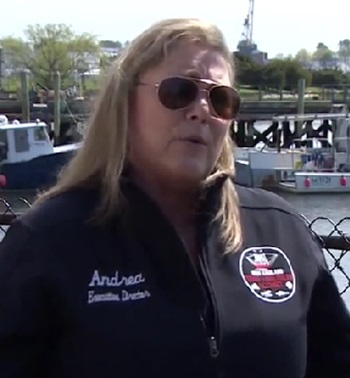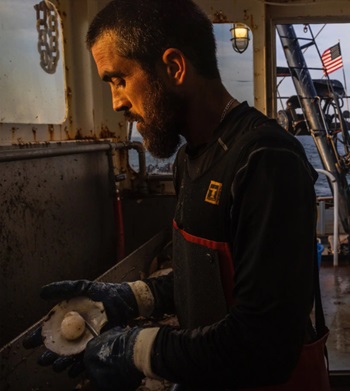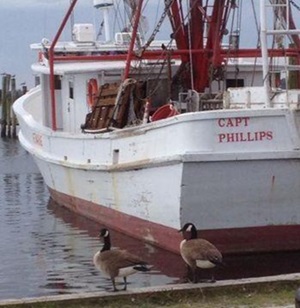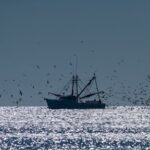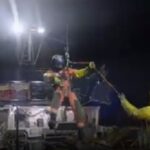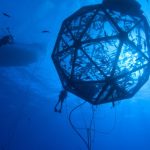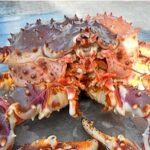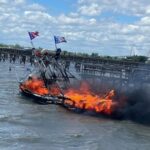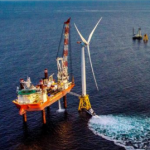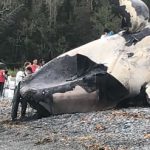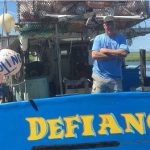Tag Archives: commercial fishing
Local shrimpers set to rally this weekend to raise awareness against imports
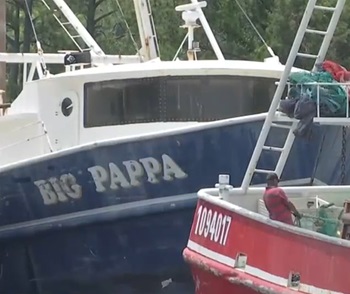 Kerry Mitchell and her husband know the challenges that come with shrimping for a living. Her husband Michael is out dragging his net off Dauphin Island. The couple owns “Salty Pirates Seafood” — and will tell you — the money is not like it used to be — mainly due to the U.S. market being flooded with shrimp from overseas. “We don’t have a level playing field. Even the government is financially supporting it,” said Kerry. The Save Our Shrimpers Act, a federal bill introduced in April of this year aims to stop that. The rally is this Saturday at the “Shrimp Lady” restaurant in Satsuma (5523 Highway 43) from 4 p.m. to 7 p.m. They’ll be local shrimpers, live music — as well as boiled Gulf Coast shrimp for those in attendance. Video, more, >>CLICK TO READ<< 14:29
Kerry Mitchell and her husband know the challenges that come with shrimping for a living. Her husband Michael is out dragging his net off Dauphin Island. The couple owns “Salty Pirates Seafood” — and will tell you — the money is not like it used to be — mainly due to the U.S. market being flooded with shrimp from overseas. “We don’t have a level playing field. Even the government is financially supporting it,” said Kerry. The Save Our Shrimpers Act, a federal bill introduced in April of this year aims to stop that. The rally is this Saturday at the “Shrimp Lady” restaurant in Satsuma (5523 Highway 43) from 4 p.m. to 7 p.m. They’ll be local shrimpers, live music — as well as boiled Gulf Coast shrimp for those in attendance. Video, more, >>CLICK TO READ<< 14:29
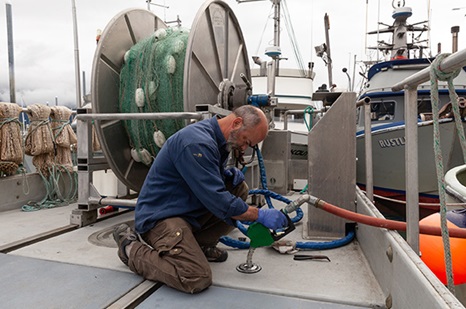
Salmon disaster relief applications for permit-holders due August 24
Federal disaster aid is on the way for some commercial fishing permit-holders in Haines and throughout the state, though many may be too wrapped up in the current season to apply for it right away. Applications for crew and subsistence users are currently available online. Unique applications for permit-holders and processors from the Pacific States Marine Fisheries Commission were mailed out on June 26 and are due August 24. Once completed the application can be mailed back to the commission or uploaded online. There’s also aid for vessel crew, and those applications are not due until September 28, but they may be harder to find. They’ll also need an affidavit from the permit holder or vessel owner they worked with to apply. more, >>CLICK TO READ<< 07:10
Santa Cruz salmon fishermen facing challenges keeping afloat
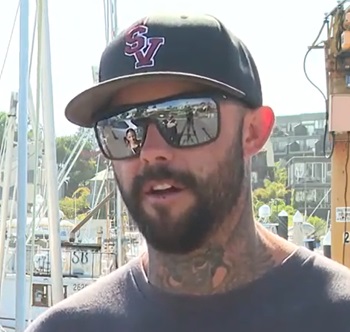 The abrupt end of salmon season, announced on April 10, has left commercial fishermen across the Central Coast grappling with economic fallout and seeking alternative income sources. “It’s frustrating to see, and I’m losing faith that we might ever even have salmon season again,” said Heidi Rhodes, CEO of H&H Fresh Fish Market. “It’s just been honestly catastrophic. We’re all waiting, just trying, hoping some federal disaster relief will come. It’s been really hard to stay afloat,” added Rhodes. In February, the U.S. Department of Commerce announced an allocation of over $20.6 million in fishery disaster funding for last year’s closure. “The disaster relief doesn’t make anyone money; it’s a band-aid on a wound that can’t stop bleeding,” said local fisherman Tim Obert. Video, more, >>CLICK TO READ<< 10:19
The abrupt end of salmon season, announced on April 10, has left commercial fishermen across the Central Coast grappling with economic fallout and seeking alternative income sources. “It’s frustrating to see, and I’m losing faith that we might ever even have salmon season again,” said Heidi Rhodes, CEO of H&H Fresh Fish Market. “It’s just been honestly catastrophic. We’re all waiting, just trying, hoping some federal disaster relief will come. It’s been really hard to stay afloat,” added Rhodes. In February, the U.S. Department of Commerce announced an allocation of over $20.6 million in fishery disaster funding for last year’s closure. “The disaster relief doesn’t make anyone money; it’s a band-aid on a wound that can’t stop bleeding,” said local fisherman Tim Obert. Video, more, >>CLICK TO READ<< 10:19
Local fishermen report mixed results in commercial season so far
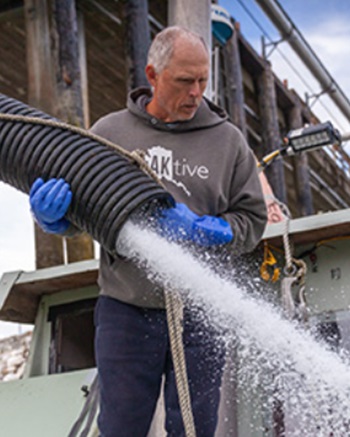 Nearly a dozen commercial fishing boats queued for gas and ice at the fuel dock on a foggy Saturday morning. The low tide set the pace slow enough for fishermen to talk to one another about the season even though they were eager to get underway. Boats bobbed up and down with names like Easy Street, Rustler, High Surf, Crown Haines, and Minnie A. Then the sun made its way through the morning clouds and the salty breeze carried the sounds of ice and fuel rolling through large plastic hoses hanging from the dock. It’s the third week since the season opener and fishermen like Matt Davis reflected on how the winds have shifted. more, >>CLICK TO READ<< 08:30
Nearly a dozen commercial fishing boats queued for gas and ice at the fuel dock on a foggy Saturday morning. The low tide set the pace slow enough for fishermen to talk to one another about the season even though they were eager to get underway. Boats bobbed up and down with names like Easy Street, Rustler, High Surf, Crown Haines, and Minnie A. Then the sun made its way through the morning clouds and the salty breeze carried the sounds of ice and fuel rolling through large plastic hoses hanging from the dock. It’s the third week since the season opener and fishermen like Matt Davis reflected on how the winds have shifted. more, >>CLICK TO READ<< 08:30
This Florida fisherman worries about the industry’s future
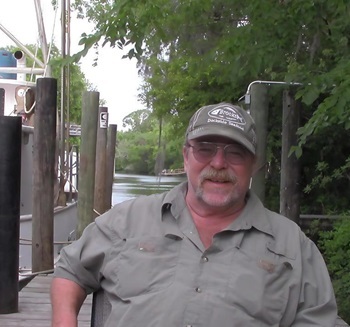 Commercial fishing is vital to Florida’s culture and identity. Today, Florida fishermen like me land $209 million worth of fish and shellfish in dock-side value alone. The economic impact of the commercial fishing industry ripples up the supply chain generating $8.7 billion. Hundreds of millions of tourists travel to Florida to enjoy fresh seafood in the Sunshine State. The National Marine Fisheries Service (NMFS) “Status of the Stocks” report that was recently released would have you believe that everything is rosy. But let me tell you what’s really happening – what you don’t see in that federal report – from the perspective and experience of someone who makes a living on the water in the Gulf of Mexico. more, >>CLICK TO READ<< 07:29
Commercial fishing is vital to Florida’s culture and identity. Today, Florida fishermen like me land $209 million worth of fish and shellfish in dock-side value alone. The economic impact of the commercial fishing industry ripples up the supply chain generating $8.7 billion. Hundreds of millions of tourists travel to Florida to enjoy fresh seafood in the Sunshine State. The National Marine Fisheries Service (NMFS) “Status of the Stocks” report that was recently released would have you believe that everything is rosy. But let me tell you what’s really happening – what you don’t see in that federal report – from the perspective and experience of someone who makes a living on the water in the Gulf of Mexico. more, >>CLICK TO READ<< 07:29
Long Island Fisherman Sentenced for Role in Fisheries Fraud Conspiracy
 A Long Island, New York, fisherman was sentenced yesterday to 30 months in prison and two years of supervised release for his role in a fisheries fraud conspiracy associated with his captainship of the trawler F/V New Age from 2014 to 2017. In October 2023, a jury convicted Christopher Winkler, of Montauk of one count of federal criminal conspiracy, two counts of mail fraud and two counts of obstruction of justice. On at least 200 fishing trips, Winkler targeted summer flounder (fluke) and black sea bass and harvested those fish in excess of quotas and state trip limits. He also falsified Fishing Vessel Trip Reports for those trips. more, >>CLICK TO READ<< 12:45
A Long Island, New York, fisherman was sentenced yesterday to 30 months in prison and two years of supervised release for his role in a fisheries fraud conspiracy associated with his captainship of the trawler F/V New Age from 2014 to 2017. In October 2023, a jury convicted Christopher Winkler, of Montauk of one count of federal criminal conspiracy, two counts of mail fraud and two counts of obstruction of justice. On at least 200 fishing trips, Winkler targeted summer flounder (fluke) and black sea bass and harvested those fish in excess of quotas and state trip limits. He also falsified Fishing Vessel Trip Reports for those trips. more, >>CLICK TO READ<< 12:45
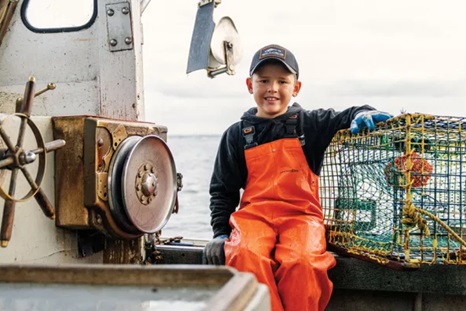
Meet One of Maine’s Youngest Lobstermen
A month after Tommy was born, his parents strapped him into a car seat and began bringing him on Seth’s lobsterboat,Irish Lady. “He’s always gone with me,” Seth said. “I did the same with my grandfather and father.” As he grew older, Tommy took to the work intuitively. He was banding lobster claws by age two and has helped steer the boat since he could walk, standing first on a bait barrel, then on a five-gallon bucket, and now on a milk crate. As soon as he was eligible, at age 8, he received a lobstering license entitling him to 10 traps; shortly after, his parents bought him his own boat. Today, he’s one of 84 licensed lobstermen aged 10 and under, according to the Maine Department of Marine Resources. Photos, more, >>CLICK TO READ<< 08:47
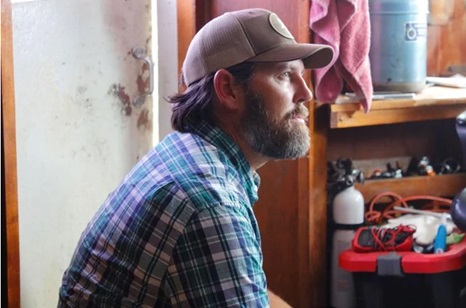
Wake Up Call Aboard The Pamela Sue
Carolina Seafood sits on Jeremy Creek, a creek named after King Jeremy, a Seewee Indian chief whose tribe lived along the creek’s banks. There I met Capt. Bryan Jones. He catches shrimp, no easy task. Besides the hard and dangerous work, he must overcome many a challenge. Capt. Jones showed me around his boat, Pamela Sue. Making our way through and past an assemblage of ropes, pulleys, nets, chains, and cables I filed a mental note. “Never bring a tripod onto a shrimp boat’s deck.” The chance of snagging something dangerous is great. Capt. Jones and I sat in the wheelhouse of his 1958 boat. As he discussed shrimping’s challenges, I looked around. I noticed bunk beds right away. Shrimpers sleep in their floating office, their home away from home. I saw too a small galley and a handsome wooden wheel caught my eye. And something else. An array of sophisticated electronics that navigate and portray bottom conditions and more. more, >>CLICK TO READ<< 10:33

The Codfather’s 2nd act: ‘I’m the bank now’
It was February 2021, and Rafael, the infamous New Bedford fishing mogul known as “the Codfather,” was serving out the final stretch of an almost four-year prison sentence. He and his two daughters placed a $770,000 bid to acquire the Merchants National Bank building in downtown New Bedford. The historic sandstone building with tall, arched windows and an ornate ceiling no longer functions as a commercial bank. It’s vacant, and there is no money locked behind its heavy, iron vaults. But for the 71-year-old Rafael — flush with more than $70 million in cash from the court-mandated sale of his fleet and barred from ever again involving himself in the commercial fishing industry — acquiring the bank set the stage for a second act. more, >>CLICK TO READ<< 06;48
Vessel Review: Yakari II – Compact multi-role fishing boat for Northern French owner
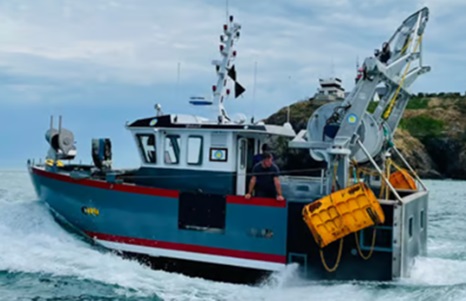 French shipbuilder Alu Acier Service Marine (AASM) recently handed over a new compact fishing vessel to owner Jean-Joseph Delaby of Cayeux-sur-Mer on France’s northern coast. F/V Yakari II was designed by local naval architecture Mer et Design in fulfillment of the owner’s requirement for a boat capable of various fishing methods. The newbuild has all-aluminium construction, a length of 10 metres (33 feet), a beam of 4.4 metres (14 feet), a depth of 1.64 metres (5.38 feet), a displacement of 23 tonnes, and a gross tonnage of 12. more, >>CLICK TO READ<< 11:1`8
French shipbuilder Alu Acier Service Marine (AASM) recently handed over a new compact fishing vessel to owner Jean-Joseph Delaby of Cayeux-sur-Mer on France’s northern coast. F/V Yakari II was designed by local naval architecture Mer et Design in fulfillment of the owner’s requirement for a boat capable of various fishing methods. The newbuild has all-aluminium construction, a length of 10 metres (33 feet), a beam of 4.4 metres (14 feet), a depth of 1.64 metres (5.38 feet), a displacement of 23 tonnes, and a gross tonnage of 12. more, >>CLICK TO READ<< 11:1`8
‘It hasn’t been crab salad weather’ – fisherman
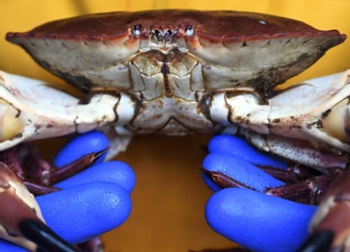 Crabs from Cromer, in Norfolk, have long featured on the menus at high-end restaurants, and tourists head to the town to sample the local delicacy. But one specialist supplier – Jonas Seafoods – has had to reduce the amount of crab it takes in, blaming a double whammy of the bad weather combined with the rise in the cost of living. “It hasn’t been crab salad weather,” said John Davies, a fisherman and fishmonger. “The economy is struggling, we are luxury food item, and the cost of living has a knock-on effect, so prices are going up everywhere,” he added. “There’s just not been the volume of people about.” more, >>CLICK TO READ<< 06:49
Crabs from Cromer, in Norfolk, have long featured on the menus at high-end restaurants, and tourists head to the town to sample the local delicacy. But one specialist supplier – Jonas Seafoods – has had to reduce the amount of crab it takes in, blaming a double whammy of the bad weather combined with the rise in the cost of living. “It hasn’t been crab salad weather,” said John Davies, a fisherman and fishmonger. “The economy is struggling, we are luxury food item, and the cost of living has a knock-on effect, so prices are going up everywhere,” he added. “There’s just not been the volume of people about.” more, >>CLICK TO READ<< 06:49
Florida Fisherman Pleads Guilty to Tax Evasion
 A Florida man pleaded guilty yesterday to evading taxes on income he earned from commercial fishing in Massachusetts. According to court documents and statements made in court, Christopher Garraty, of New Port Richey, and formerly of Newport and East Greenwich, Rhode Island, worked as a commercial fisherman and deckhand for fishing companies operating out of New Bedford, Massachusetts. Despite earning substantial income working as a fisherman, Garraty did not file until 2012 any federal income tax returns for tax years 2002 through 2011. When he filed the delinquent returns, he reported that he owed a total of approximately $234,497 in taxes for those nine years. But even after reporting that he owed taxes, Garraty did not make any payments to the IRS. In addition, Garraty did not file returns for 2015 through 2018 despite earning approximately $600,000 in fishing income across those years and owing approximately $179,382 in taxes. more, >>CLICK TO READ<< 16:07
A Florida man pleaded guilty yesterday to evading taxes on income he earned from commercial fishing in Massachusetts. According to court documents and statements made in court, Christopher Garraty, of New Port Richey, and formerly of Newport and East Greenwich, Rhode Island, worked as a commercial fisherman and deckhand for fishing companies operating out of New Bedford, Massachusetts. Despite earning substantial income working as a fisherman, Garraty did not file until 2012 any federal income tax returns for tax years 2002 through 2011. When he filed the delinquent returns, he reported that he owed a total of approximately $234,497 in taxes for those nine years. But even after reporting that he owed taxes, Garraty did not make any payments to the IRS. In addition, Garraty did not file returns for 2015 through 2018 despite earning approximately $600,000 in fishing income across those years and owing approximately $179,382 in taxes. more, >>CLICK TO READ<< 16:07
Fresh Off the Boat
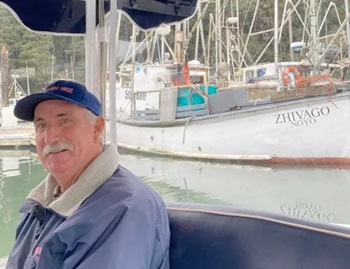 California fisheries are considered a “Legacy Industry” that sustains local families while helping to attract tourists. Shockingly, the California commercial fleet that included 5,000 boats in 1980 diminished to only 464 vessels by 2022, and Fort Bragg is home to 103 of these registered commercial fishing boats. The fish catchers who are still fishing are finding it increasingly necessary to “adapt or die.” Fortunately, Noyo Harbor seems to have some very resourceful people who have taken this challenge to heart and devised some innovative ways to help get the freshest fish onto your dinner table. Dan Platt, aka Captain Dan, is a commercial fisherman, diver, and owner of Noyo Harbor Tours in Fort Bragg. He owns two boats: the Zhivago, a converted 1931 former Coast Guard craft for fishing, and The Noyo Star, his eco-friendly electric tour boat. The recent tough times in California fisheries encouraged Dan to think outside the box. To improve his bottom line, he is sometimes able to sell his fish direct from his boat to customers on the dock, cutting out the middleman. more, >>CLICK TO READ<<10:20
California fisheries are considered a “Legacy Industry” that sustains local families while helping to attract tourists. Shockingly, the California commercial fleet that included 5,000 boats in 1980 diminished to only 464 vessels by 2022, and Fort Bragg is home to 103 of these registered commercial fishing boats. The fish catchers who are still fishing are finding it increasingly necessary to “adapt or die.” Fortunately, Noyo Harbor seems to have some very resourceful people who have taken this challenge to heart and devised some innovative ways to help get the freshest fish onto your dinner table. Dan Platt, aka Captain Dan, is a commercial fisherman, diver, and owner of Noyo Harbor Tours in Fort Bragg. He owns two boats: the Zhivago, a converted 1931 former Coast Guard craft for fishing, and The Noyo Star, his eco-friendly electric tour boat. The recent tough times in California fisheries encouraged Dan to think outside the box. To improve his bottom line, he is sometimes able to sell his fish direct from his boat to customers on the dock, cutting out the middleman. more, >>CLICK TO READ<<10:20
Commercial salmon fishermen eye Klamath dam removal with cautious hope
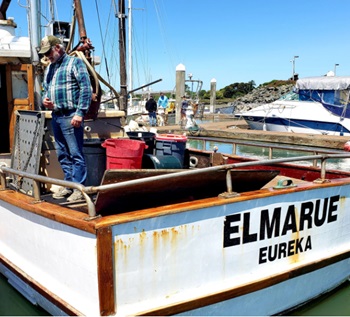 At 76, he still fishes for salmon alone. Standing in the cockpit on the stern deck of his wooden trawler, Elmarue, he can keep an eye on all six wires; when one of the lines starts to dance, he brings the fish in, stunning it with his gaff while it’s still in the water. Then he uses the tool to hook the salmon behind the gills and swings it onto the deck. “By the way, I want that fish cleaned and chilling in a single water flush within half an hour; that’s the standard,” says Dave Bitts. “I want you to enjoy eating it as much as I enjoyed catching it.”In April, for the second year in a row, the Pacific Fishery Management Council voted unanimously to close California’s commercial and recreational ocean salmon fishery. The closure was based on woefully low numbers of adult salmon expected to return to several California rivers. more, >>CLICK TO READ<< 12:58
At 76, he still fishes for salmon alone. Standing in the cockpit on the stern deck of his wooden trawler, Elmarue, he can keep an eye on all six wires; when one of the lines starts to dance, he brings the fish in, stunning it with his gaff while it’s still in the water. Then he uses the tool to hook the salmon behind the gills and swings it onto the deck. “By the way, I want that fish cleaned and chilling in a single water flush within half an hour; that’s the standard,” says Dave Bitts. “I want you to enjoy eating it as much as I enjoyed catching it.”In April, for the second year in a row, the Pacific Fishery Management Council voted unanimously to close California’s commercial and recreational ocean salmon fishery. The closure was based on woefully low numbers of adult salmon expected to return to several California rivers. more, >>CLICK TO READ<< 12:58
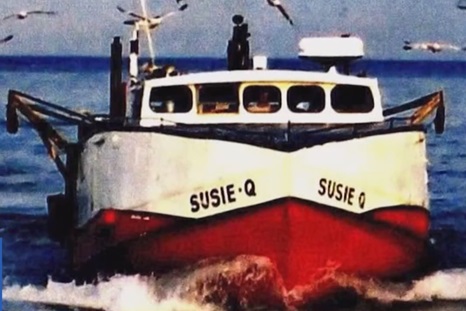
‘We need it desperately’: Great Lakes Commercial Fishermen look for help as industry shrinks
Commercial fishing on the Great Lakes began 150 years ago, and fishermen once numbered in the thousands. Now, only a handful of businesses are still at it, and many are aging out and looking for help. Jamie LeClair represents the fifth generation involved in her family-run commercial fishing business. Titus Seilheimer, a fisheries specialist for the Wisconsin Sea Grant, said the industry needs to start training the next generation of commercial fishermen. “There are concerns. A lot of folks I work with are getting older, and the fleet is getting grayer,” said Seilheimer. “That’s an issue here in the Great Lakes, but really any fishery.” Video, more, >>CLICK TO READ<< 12:57
Fisherman remembered as ‘hero’ for saving deckhand after shrimp boat capsizes in Mobile Bay
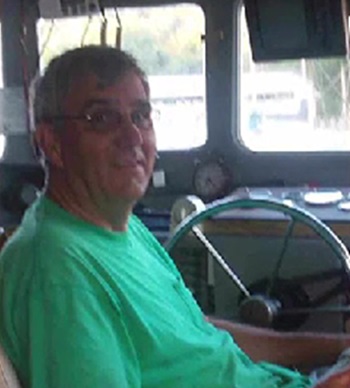 Boat captain and shrimper, Mike Bishop, was killed when a waterspout Saturday flipped over his boat, trapping him inside. His deckhand Mark Henderson survived the horror after floating in the water for seven hours. Bishop tried to save Henderson before several others pulled together. Now, he’s being called a hero…and he’s not the only one. Mike’s son Brandon Bishop says this was a team effort from many heroes. “The shrimping community is tight and everybody comes together,” Brandon said. “Especially in these hard times like this. And shrimping is not a job. It’s a way of life and my dad loved it.” “When I went and spoke to Mark his deckhand this morning in the hospital he was still pretty shaken up,” Brandon said. “But he said that my dad gave him a lifejacket and told him to go out back. They were hit by the waterspout, and my dad’s a hero, he saved someone’s life….” Video, more, >>CLICK TO READ<< 12:27
Boat captain and shrimper, Mike Bishop, was killed when a waterspout Saturday flipped over his boat, trapping him inside. His deckhand Mark Henderson survived the horror after floating in the water for seven hours. Bishop tried to save Henderson before several others pulled together. Now, he’s being called a hero…and he’s not the only one. Mike’s son Brandon Bishop says this was a team effort from many heroes. “The shrimping community is tight and everybody comes together,” Brandon said. “Especially in these hard times like this. And shrimping is not a job. It’s a way of life and my dad loved it.” “When I went and spoke to Mark his deckhand this morning in the hospital he was still pretty shaken up,” Brandon said. “But he said that my dad gave him a lifejacket and told him to go out back. They were hit by the waterspout, and my dad’s a hero, he saved someone’s life….” Video, more, >>CLICK TO READ<< 12:27
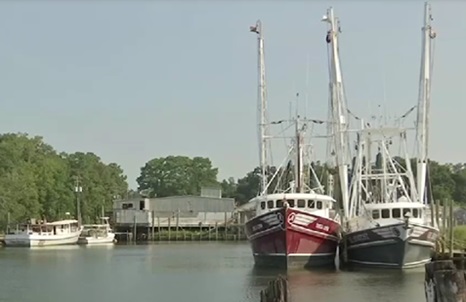
Alabama on verge of requiring sellers to say where their seafood comes from
The seafood industry that put this small city on the map says it is in crisis, buffeted by foreign imports that have driven down the price of shrimp to as little as a dollar per pound. Those prices are comparable to what shrimp fetched in the early 1980s – too low, Steve Sprinkle said, for many operators even to take their boats out. But the Alabama Legislature is trying to at least make it easier for consumers who want to buy local. A bill that got final approval this week would require restaurants to include “country of origin” information on or with the menu. There’s a similar requirement for good trucks and stores. Video, more, >>CLICK TO READ<< 09:48
Anchoring the Family: The Life, Labor and Love of an Alaskan Fishing Mom
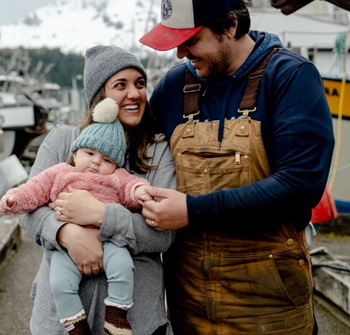 It’s called a labor of love for a reason. A life in fishing – especially in Alaska – can be equally rough and rewarding, spending days at sea where the wonders of the world take shape in glacial ridges and splashes of fish slipping over each other on deck. What you don’t always see is the effort, will, patience and passion of the people caring for those on the water from behind the shoreline. On the rugged coast of southern Alaska, where icy waters provide hope for a rich season, Kinsey Brown and her husband, Zeke, have woven their lives into the fabric of their small fishing community. It’s been said countless times by dedicated seafood harvesters across the globe that fishing is more than a livelihood. It’s a calling, community and a legacy that nearly all who fish hope to pass down to the newest generations of their fishing families. Video, photos, more, >>CLICK TO READ<< 10:30
It’s called a labor of love for a reason. A life in fishing – especially in Alaska – can be equally rough and rewarding, spending days at sea where the wonders of the world take shape in glacial ridges and splashes of fish slipping over each other on deck. What you don’t always see is the effort, will, patience and passion of the people caring for those on the water from behind the shoreline. On the rugged coast of southern Alaska, where icy waters provide hope for a rich season, Kinsey Brown and her husband, Zeke, have woven their lives into the fabric of their small fishing community. It’s been said countless times by dedicated seafood harvesters across the globe that fishing is more than a livelihood. It’s a calling, community and a legacy that nearly all who fish hope to pass down to the newest generations of their fishing families. Video, photos, more, >>CLICK TO READ<< 10:30
Staggered lobster starts don’t suit all fishers
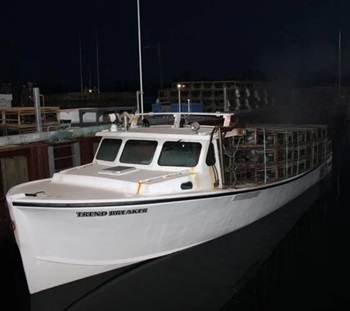 For the second straight year, PEI’s north and south side lobster zones had their setting days on different dates, but not everyone agrees with it. David Sansom, port manager at Red Head Harbour in Morell, said he isn’t a fan of not starting on the same day. However, he said data shows the offshore area Morell fishes, between Naufrage and Covehead harbours, has been one of the coldest on the Island in recent years, which affects lobster movement. Starting dates are influenced by many factors, including temperature on the bottom, weather and the tides. The north side had April 29 as their tentative starting date but several days of strong north winds delayed their season by almost a week until this past Sunday. Photos, more, >>CLICK TO READ<< 08:10
For the second straight year, PEI’s north and south side lobster zones had their setting days on different dates, but not everyone agrees with it. David Sansom, port manager at Red Head Harbour in Morell, said he isn’t a fan of not starting on the same day. However, he said data shows the offshore area Morell fishes, between Naufrage and Covehead harbours, has been one of the coldest on the Island in recent years, which affects lobster movement. Starting dates are influenced by many factors, including temperature on the bottom, weather and the tides. The north side had April 29 as their tentative starting date but several days of strong north winds delayed their season by almost a week until this past Sunday. Photos, more, >>CLICK TO READ<< 08:10
NCFA Weekly Update for May 6, 2024
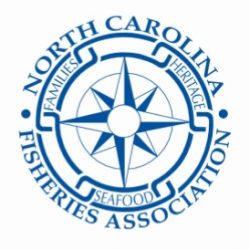 Last week’s newsletter got quite a bit of attention, prompting several folks to reach out to me directly in regard to the constitutional “right” to hunt and fish seen below. You’ll also notice that the purpose of the Right to Hunt and Fish Constitutional Amendments is to prevent hunting and fishing from being banned, not to elevate one citizen’s right to fish over that of another. Legislative updates, more, >>CLICK TO READ<< 07:55
Last week’s newsletter got quite a bit of attention, prompting several folks to reach out to me directly in regard to the constitutional “right” to hunt and fish seen below. You’ll also notice that the purpose of the Right to Hunt and Fish Constitutional Amendments is to prevent hunting and fishing from being banned, not to elevate one citizen’s right to fish over that of another. Legislative updates, more, >>CLICK TO READ<< 07:55
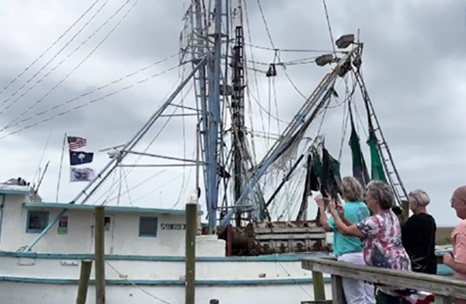
A call for the price of shrimp to rise as St. Helena Island’s boats head to sea
The future is uncertain for shrimpers in coastal South Carolina, but you wouldn’t know that from the bright, buoyant crowd that gathered Saturday at the Gay Fish Company. Attendees rang in the start of the 2024 season with cowbells and noisemakers, sending off a fleet of shrimp trawlers into the Harbour River as their nets waved like sails in the gentle morning breeze. Owned by a family of veterans spanning three generations, the Gay Fish Company on St. Helena Island held its inaugural “Blessing of the Fleet” Saturday morning. Typically involving a local pastor praying over captains for a safe and bountiful season, the practice has been a staple in fishing communities for centuries. But as fisheries up and down the coast grapple with industry shakeups from overseas, the ceremony takes on a new sort of significance. Photos, Video, more, >>CLICK TO READ<< 08:29
Useless unless worn
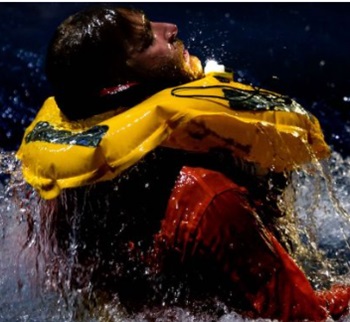 Great efforts have been made by all to produce meaningful, practical projects and help develop wearable floatation equipment in conjunction with fishermen and the manufacturers of floatation equipment, according to RNLI fishing safety manager Frankie Horne. He said that this has led to some real improvements in Personal Floatation Device (PFD) products. ‘As the saying goes, Useless Unless Worn, and it’s so true. We can talk about how things were done in the past, but as they say, the past is where things were done differently. Unfortunately, this attitude is why we keep seeing preventable fatalities in the fishing industry. In fact, some of the most vulnerable fishing activities have the worst PFD wear rate,’ he said. more, >>CLICK TO READ<< 19:01
Great efforts have been made by all to produce meaningful, practical projects and help develop wearable floatation equipment in conjunction with fishermen and the manufacturers of floatation equipment, according to RNLI fishing safety manager Frankie Horne. He said that this has led to some real improvements in Personal Floatation Device (PFD) products. ‘As the saying goes, Useless Unless Worn, and it’s so true. We can talk about how things were done in the past, but as they say, the past is where things were done differently. Unfortunately, this attitude is why we keep seeing preventable fatalities in the fishing industry. In fact, some of the most vulnerable fishing activities have the worst PFD wear rate,’ he said. more, >>CLICK TO READ<< 19:01
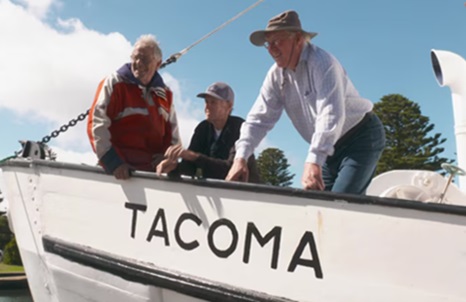
Port Fairy residents reminiscence origins of 1950s pioneering fishing boat, Tacoma
When the grand old wooden fishing boat Tacoma returned home to Port Fairy, its skipper Ross Haldane was transported back 72 years. The 76-year-old grandfather was one of the seven children onboard when the boat left in the early 1950s destined for South Australia to bolster the state’s growing 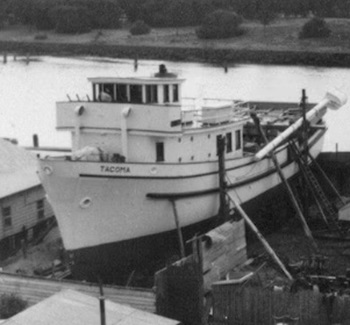 fishing industry. “I remember the boat going into its first big waves — we quickly ran down into the galley and watched the waves from there,” Ross said. Ross and one of the original crew members, 90-year-old Jack Bellamy, made the return trip this year aboard the Tacoma from Port Lincoln to Port Fairy, where it arrived on March 25. Photos, Video, more, >>CLICK TO READ<< 06:30
fishing industry. “I remember the boat going into its first big waves — we quickly ran down into the galley and watched the waves from there,” Ross said. Ross and one of the original crew members, 90-year-old Jack Bellamy, made the return trip this year aboard the Tacoma from Port Lincoln to Port Fairy, where it arrived on March 25. Photos, Video, more, >>CLICK TO READ<< 06:30
Dockside Safety Exam Program – Coast Guard helps commercial fishermen ensure a safe catch
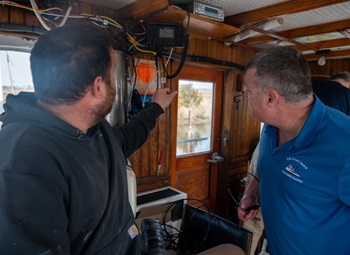 As the nation’s largest estuary, the Chesapeake Bay is a highly valued resource for more than 18 million people who live in its watershed. Producing about 500 million pounds of seafood each year, the Bay supports commercial and recreational fishing and creates one of the most economically significant regions of the Unites States. According to NOAA and the U.S. Bureau of Labor Statistics, commercial fishing is one of the country’s most dangerous occupations. “What we do for the local fishing community is support their workplace safety,” said Timothy Diehl, a Coast Guard vessel safety examiner from Sector Maryland-National Capital Region in Baltimore, Maryland. Most of Diehl’s workdays are spent traveling to area marinas where he meets with commercial fishing vessel operators and owners. Photos, more, >>CLICK TO READ<< 07:21
As the nation’s largest estuary, the Chesapeake Bay is a highly valued resource for more than 18 million people who live in its watershed. Producing about 500 million pounds of seafood each year, the Bay supports commercial and recreational fishing and creates one of the most economically significant regions of the Unites States. According to NOAA and the U.S. Bureau of Labor Statistics, commercial fishing is one of the country’s most dangerous occupations. “What we do for the local fishing community is support their workplace safety,” said Timothy Diehl, a Coast Guard vessel safety examiner from Sector Maryland-National Capital Region in Baltimore, Maryland. Most of Diehl’s workdays are spent traveling to area marinas where he meets with commercial fishing vessel operators and owners. Photos, more, >>CLICK TO READ<< 07:21
Local fishermen speak out against proposed bill seeking further restrictions on commercial fishing
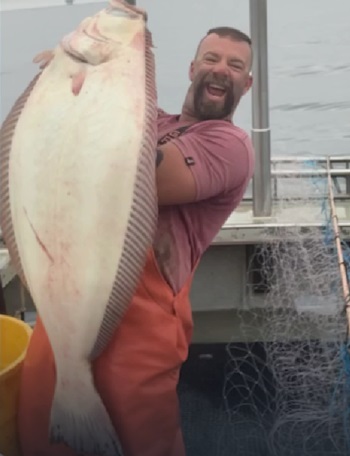 For Zack Robinson, fishing isn’t just a job. “The ocean’s my life,” he said. Robinson has been gillnetting for 15 years, catching halibut and seabass. “Gillnetting is my passion. I love it. There are a lot of misconceptions about net fishing. It’s not a dirty fishery like they say it is. We are not the bad guys, and that hurts, to work so hard and to be told you’re no good,” Robinson said. He says that if Assembly Bill 2220 passes, it would threaten his livelihood. “Any more regulation might take us out completely. “People don’t stop eating halibut or swordfish, what they do is they’ll get it from another source,” Hyman said. Kimberly Ray suggests gill-netters can find another way to fish. more, >>click to read<< 09:35
For Zack Robinson, fishing isn’t just a job. “The ocean’s my life,” he said. Robinson has been gillnetting for 15 years, catching halibut and seabass. “Gillnetting is my passion. I love it. There are a lot of misconceptions about net fishing. It’s not a dirty fishery like they say it is. We are not the bad guys, and that hurts, to work so hard and to be told you’re no good,” Robinson said. He says that if Assembly Bill 2220 passes, it would threaten his livelihood. “Any more regulation might take us out completely. “People don’t stop eating halibut or swordfish, what they do is they’ll get it from another source,” Hyman said. Kimberly Ray suggests gill-netters can find another way to fish. more, >>click to read<< 09:35
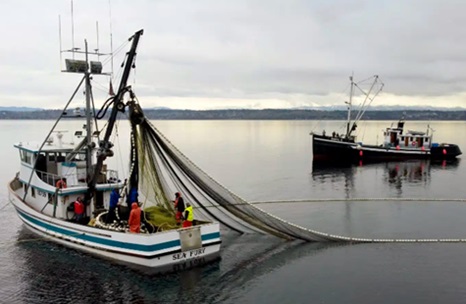
Crew School provides a reality sea trial for commercial fishing wanabees
Along Gig Harbor’s waterfront, this vocational trend is gently materializing in the form of a newly organized Crew School for potential commercial fishermen — and women. During March, seven people completed this hands-on training program that essentially offers a reality-based test drive for those interested in commercial fishing aboard a 58-foot purse seiner. Lifelong local fisherman and purse seine captain Gregg Lovrovich is program lead and creator of the crew-in-training curriculum. He coaches rookies through knot skills, gear maintenance, net setting/handling, safety and survival skills, not to mention the realities of living for months in a 58-foot space with 3-4 crew members who get all too familiar with one another. Photos, more, >>click to read<< 13:04






